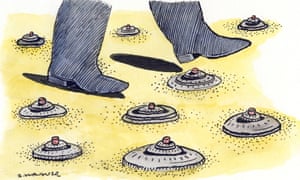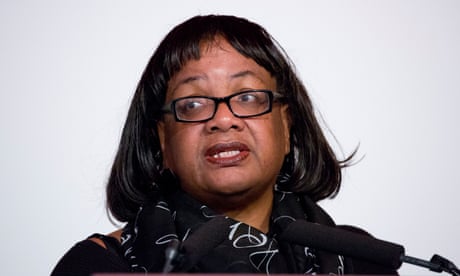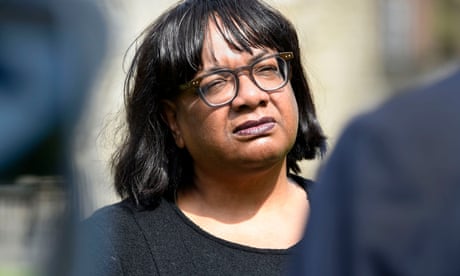
Illustration by Andrzej Krauze
Diane Abbott wrote a powerful article in these pages last week about the hatred she receives. Whatever one thinks of her politics, the veteran Labour MP has for decades been a fireball of public service. But her star has always been followed by a comet tail of toxic vapour. This personal abuse is at times snide and implied, at other times explicit, vicious and unprintable. But it is a constant in her political life, following her round, undermining her, consistently framing her in terms of her gender and her race.
Abbott’s article came just days after she received an exceptional and sustained amount of personal abuse over the article 50 vote, culminating in a leaked text sent by Brexit secretary David Davis, in which he made derogatory comments on her appearance. Her article was necessary and timely, but something about her speaking out made my heart sink. It felt like defeat; the ultimate feeding of the trolls. It is important to look beyond the headlines and understand the significance of what happened.
The fact is that her tormentors had hounded this most resilient of characters to a point where she finally cracked and, breaking a longstanding habit in a 30-year career of not commenting on personal insults, she laid it all out. She was forced to sound an alert, warning that something must be done before we get to the point in our democracy where women and minority candidates, already low in number, are bullied out of the political arena altogether.
Diane Abbott wrote a powerful article in these pages last week about the hatred she receives. Whatever one thinks of her politics, the veteran Labour MP has for decades been a fireball of public service. But her star has always been followed by a comet tail of toxic vapour. This personal abuse is at times snide and implied, at other times explicit, vicious and unprintable. But it is a constant in her political life, following her round, undermining her, consistently framing her in terms of her gender and her race.
Abbott’s article came just days after she received an exceptional and sustained amount of personal abuse over the article 50 vote, culminating in a leaked text sent by Brexit secretary David Davis, in which he made derogatory comments on her appearance. Her article was necessary and timely, but something about her speaking out made my heart sink. It felt like defeat; the ultimate feeding of the trolls. It is important to look beyond the headlines and understand the significance of what happened.
The fact is that her tormentors had hounded this most resilient of characters to a point where she finally cracked and, breaking a longstanding habit in a 30-year career of not commenting on personal insults, she laid it all out. She was forced to sound an alert, warning that something must be done before we get to the point in our democracy where women and minority candidates, already low in number, are bullied out of the political arena altogether.

Diane Abbott: misogyny and abuse are putting women off politics
Since then, she has been forced to go further, revealing this weekend that she does not walk or drive around her constituency as freely as she used to because, in the wake of Jo Cox’s murder, the death threats she receives can’t be shrugged off any more. It was a piece in which she used the word “I” for the first time in respect of her identity – it wasn’t about her profession or her political views. It is this forced “coming out” by Abbott as a black woman in public life that was disheartening.
Contrary to the view so widely held on the right, of this country being in the grip of a constantly aggrieved professional-victim class, few people actually like to talk about their experience of receiving abuse. It is uncomfortable and excruciating and diminishing, and above all a distraction when one just wants to get on with one’s business.
It is also, as many who are on the receiving end of such onslaughts (including myself) can testify, boring and predictable to have to keep running the gauntlet between attack and defence. There is another, silencing fear, as the bile swirls and rises around you: that you come across as attention-seeking or fragile. Above all, you want to show that the blows have not landed.
But when somebody occupies a public position, not speaking out becomes an abdication. It is a decision that is never taken lightly because it plays into the hands of the racists and misogynists whose ultimate motivating animus is to disabuse you of the notion that you can ever be anything but a woman who does not know her place or a member of an inferior race.
Oh but now you wince at the N-word. Come on now, you might say, let’s not get carried away and blow it all out of proportion. And besides, Abbott is hardly a flawless political figure who doesn’t deserve criticism. OK, she gets compared to a monkey and is the butt of her male colleague’s jokes about being too unattractive to hug, but what about sending her child to private school?
This is the line of argument that enables the masking of abuse behind legitimate criticism of an individual or their views. As if calling for a tree strong enough to carry her weight so she can be hanged, as was said, is a logical follow-on from any of her failings or political hypocrisies.
And then there are the accusations of playing the race card or the gender card – both denying that the abuse is real, and blaming the victim for using their minority status as a shield of deflection. It is a closed loop, a circular firing squad. You either accept the abuse with grace, turn the other cheek, or invite more abuse and derision for speaking out against it. The logical conclusion is that the only winning move is not to play.
It is ultimately this potential chilling effect that forces people to break their silence. Abbott said she had never complained until now. And she will have known of the potential cost to her stature, not to mention the possibility that her perceived vulnerability might encourage trolls further.
But ultimately, she said, she went into politics “to create space for women and other groups who have historically been treated unfairly”. It is only by creating this space that the abuse will subside, and that an individual like Diane Abbott will no longer be an offending novelty who is seen to only represent her own narrow racial or gender interests, rather than the people who elected her.

Diane Abbott on abuse of MPs: 'My staff try not to let me go out alone'
She and others like her are obliged to confront one of the most persistent political myths: that identity politics is a divisive phenomenon that actively seeks to separate minorities or women from the mainstream, conferring on them dispensation to act with impunity because any criticism is automatically bigotry. It is a notion that fails to recognise what is obvious, which is that identity is dictated from above. Abbott’s defining character as a black woman is imposed and kept alive by others, not by her. She has spent decades integrating into the mainstream.
Women or minorities aren’t droning on about discrimination and abuse because they’re snowflakes demanding special treatment. They do so because they keep being limited, circumscribed, told that they cannot have roles in public life that extend beyond their identity. But then they are condemned when they respond in terms of what is being attacked. But what else can one do? Hannah Arendt said: “If one is attacked as a Jew, one must defend oneself as a Jew.”
Playing identity politics, as critics describe it, seems less an offensive ploy than a defensive posture, akin to raising your arms to cover your face when it is repeatedly being punched.
The whole affair exemplifies the precariousness of how to deal with what is now an epidemic. Silence is not an option. Even those not personally distressed have a duty towards others – those younger, more vulnerable or just made of different stuff – to clear the way for them to claim their rightful positions in public life. But there is also a risk that by doing so, any progress minorities or women have made to break out of their pen is undermined. It is a quiet stranglehold. Diane Abbott is trying to break free of it, but at what price?
